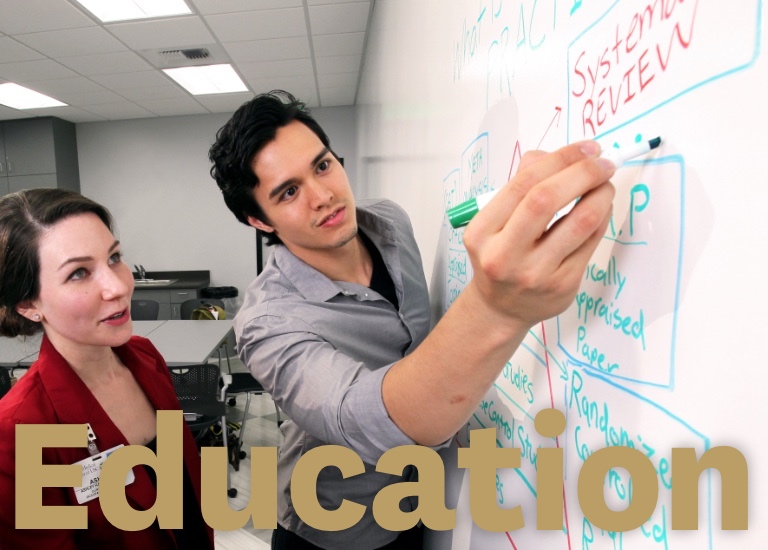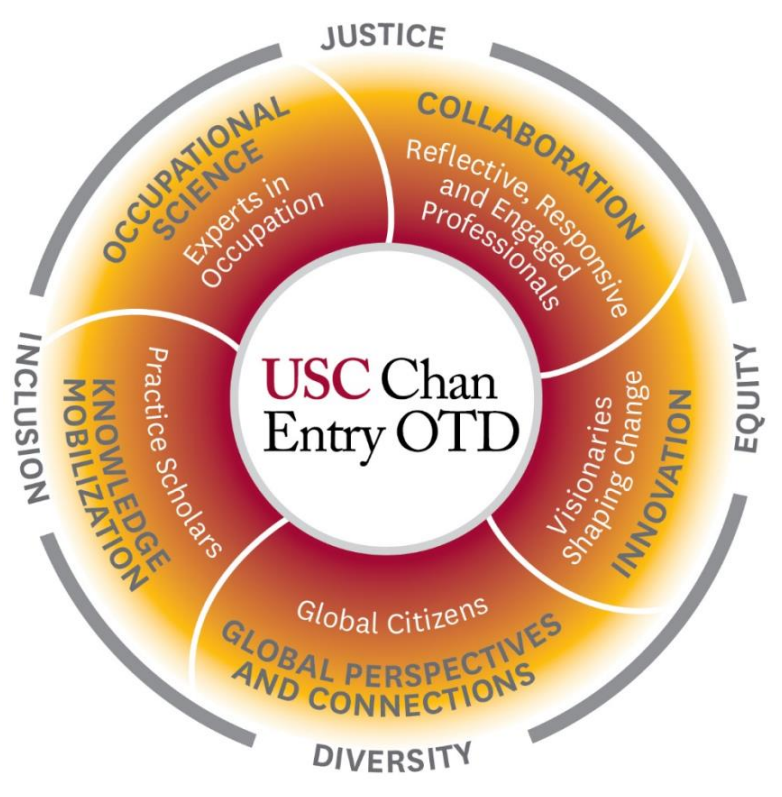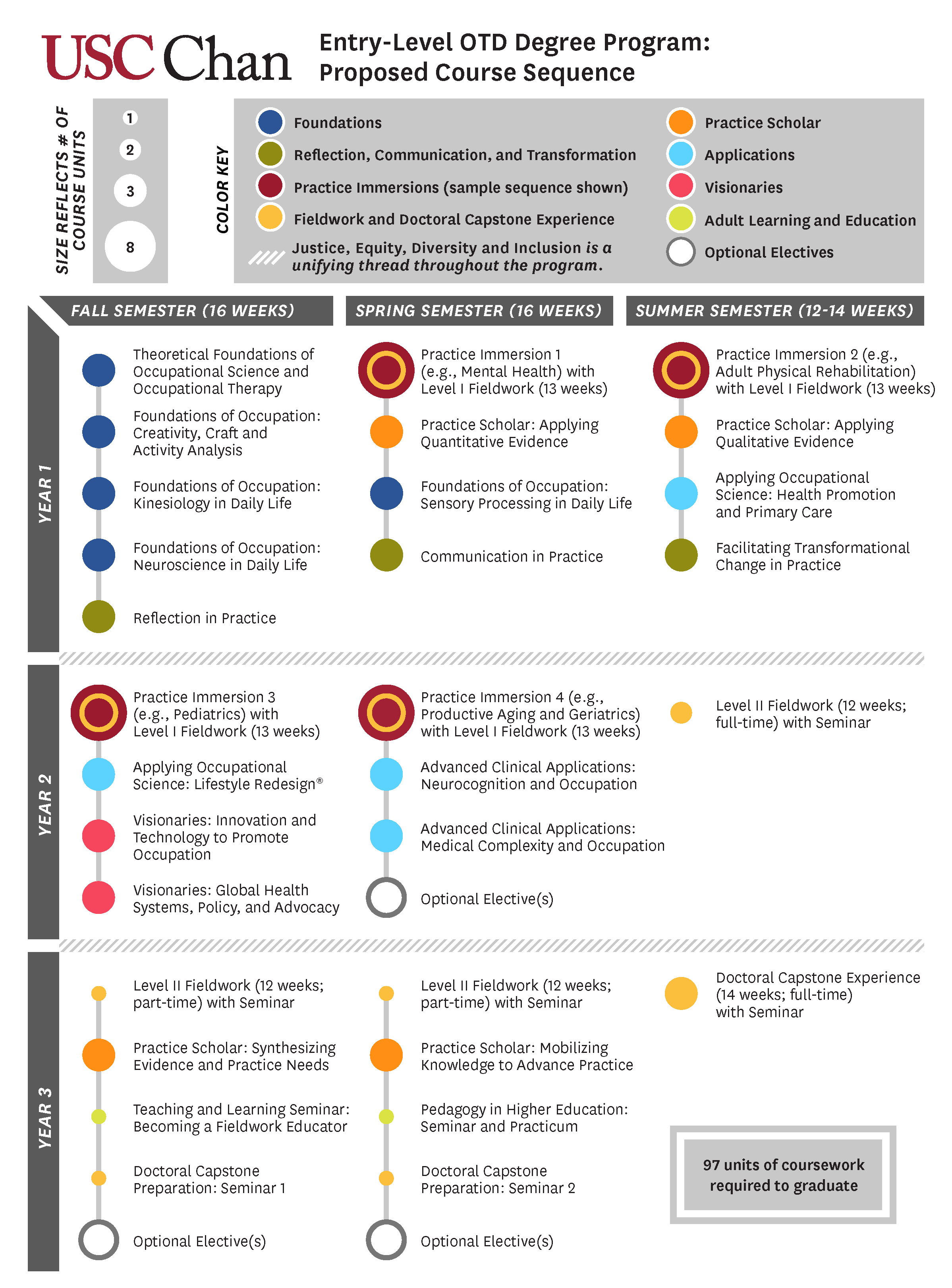Entry-Level Doctorate (OTD)
of Occupational Therapy
The USC Chan Entry-Level OTD program is built upon one of the nation’s top-ranked occupational therapy graduate programs, according to U.S. News and World Report. This program is designed for students with bachelor’s degrees in fields other than occupational therapy. If you are already a certified or board-eligible occupational therapist, please see information about our Post-Professional OTD degree program.
Our curriculum has been designed to prepare you to become:
- An expert in occupation who understands the power of occupation and its impact on health and well-being, its therapeutic uses, and the study of occupational science
- A reflective, responsive, and engaged professional prepared to provide compassionate and culturally-responsive care
- A practice scholar with clinical reasoning skills who employs evidence-based practice
- A global citizen equipped to participate in addressing needs of increasingly global communities, locally and abroad
- A visionary shaping change who is able to navigate complex systems and innovate through new concepts, protocols, frameworks, and technologies
The USC Chan Entry-Level OTD program requires the completion of 97 units of coursework, including:
- Professional coursework required by the Accreditation Council for Occupational Therapy Education® (ACOTE®)
- Four practice immersions in Pediatrics, Mental Health, Adult Physical Rehabilitation, and Productive Aging and Geriatrics
- Elective courses to build specialized expertise in areas of your interest
- Level I and Level II fieldwork experiences to observe and then gain hands-on experience with clients under the supervision of a registered/licensed occupational therapist or other healthcare professional
- A full-time, 14-week Doctoral Capstone Experience in which you are immersed in a real-world context of advanced clinical practice, research, policy and advocacy or pedagogy
You are also required to maintain a GPA of 3.0 or better (both applied and overall) throughout the program.
Becoming a Registered and Licensed Occupational Therapist
Once you have successfully completed all professional coursework including the required number of fieldwork hours and DCE, you are eligible to sit for the OTR® certification examination offered by the National Board for Certification in Occupational Therapy® (NBCOT®). Visit nbcot.org for specific information on the examination process. A felony conviction may affect your ability to sit for the NBCOT® certification examination or attain state licensure. You must pass this examination to earn the designation “Occupational Therapist, Registered” (OTR) and, after ensuring compliance with state licensing regulations, you can begin practicing as a licensed and registered occupational therapist.
Fieldwork
Fieldwork provides invaluable hands-on experiences in key practice areas of occupational therapy. Level I fieldwork is embedded in each of the four practice immersion courses with one fieldwork day a week for a 9-week period. Level II fieldwork consists of one 12-week, full-time experience during the summer of your second year, and one 24-week, part-time experience across the fall and spring semesters of your third year. Your two Level II experiences will be in distinctly different practice areas.
As a distinct, signature element of USC’s entry-level OTD program, your second Level II experience will be in the same setting as your Doctoral Capstone Experience, allowing you to develop in-depth knowledge and skills through a combined, year-long immersion in one setting. Our team of academic fieldwork coordinators will work with you to find placements corresponding with your interests and desired geographic location.
See more information about Fieldwork at USC Chan, including the Fieldwork Team, and forms/documents for current USC Chan students.
Doctoral Capstone Experience
The DCE looks different for every entry-level OTD student because it provides opportunities to create your own 14-week learning plan in order to specialize in clinical practice, research, policy and advocacy, administration or pedagogy. The DCE can be completed remotely, which allows opportunities to travel abroad or domestically throughout your entire third year. As described above, it is intended that your second Level II fieldwork site is where you will complete your DCE.
If you wish to travel abroad or complete your second Level II fieldwork experience and DCE outside of Los Angeles, you will have the option to participate in remote sections of the third-year entry-level OTD courses. You will need to plan in advance and closely coordinate your plans with our fieldwork team. Participation in remote courses throughout the third year of the program will require knowledge in using Brightspace as a Learning Management System, and skills in using and navigating remote learning tools, such as Zoom, Turnitin, and others. You will have opportunities to learn this technology and acquire these competencies prior to the third year of the program.
During your final summer of enrollment, you will submit a doctoral portfolio demonstrating competence in your chosen DCE concentration. The final portfolio will include documentation of both written and oral presentation skills, expertise as designated in your DCE plan and your envisioned future as a leader in the profession.
Program Outcomes and Curriculum Threads
The following is an overview of USC’s Entry-Level Doctorate of Occupational Therapy degree program outcomes and associated curriculum threads.
The core of our curriculum design is depicted in the model above. The model highlights the entry-OTD program outcomes and associated curriculum threads, which represent thematic content that is woven throughout the course scope and sequence, and reflected in learning activities and assessment. The threads are:
- occupational science;
- collaboration;
- knowledge mobilization;
- global perspectives and connections; and
- innovation
Each curriculum thread is influenced by a universal thread of justice, equity, diversity and inclusion; together, these threads relate to all areas of occupational therapy practice. Please see the Entry-Level Professional Doctorate (OTD) Student Handbook to learn more.
The following is an overview of the three years of study required for USC’s Entry-Level Doctorate of Occupational Therapy degree. Courses are subject to change.
First-Year Courses
Fall Semester 1
Fall semester generally begins in late August and continues for 16 weeks.
- OT 510 (3 units): Foundations of Occupation: Kinesiology in Daily Life
- OT 511 (3 units): Reflection in Practice
- OT 514 (3 units): Foundations of Occupation: Neuroscience in Daily Life
- OT 516 (3 units): Foundations of Occupation: Creativity, Craft and Activity Analysis
- OT 519 (3 units): Theoretical Foundations of Occupational Science and Occupational Therapy
Spring Semester 1
Spring semester begins in January and continues for 16 weeks.
- Practice Immersion Course (ONE of the following, along with 13 weeks of corresponding Level I Fieldwork, one day per week):
- OT 501 (8 units): Adult Physical Rehabilitation
- OT 502 (8 units): Mental Health
- OT 503 (8 units): Pediatrics
- OT 504 (8 units): Productive Aging and Geriatrics
- OT 517 (3 units): Foundations of Occupation: Sensory Processing in Daily Life
- OT 521 (3 units): Communication in Practice
- OT 526 (3 units): Practice Scholar: Applying Quantitative Evidence
AND:
Summer Semester 1
Summer semester begins in mid-May and continues for 12 weeks.
- Practice Immersion Course (ONE of the following, along with 13 weeks of corresponding Level I Fieldwork, one day per week):
- OT 501 (8 units): Adult Physical Rehabilitation
- OT 502 (8 units): Mental Health
- OT 503 (8 units): Pediatrics
- OT 504 (8 units): Productive Aging and Geriatrics
- OT 531 (3 units): Facilitating Transformational Change in Practice
- OT 536 (3 units): Practice Scholar: Applying Qualitative Evidence
- OT 539 (3 units): Applying Occupational Science: Health Promotion and Primary Care
AND:
Second-Year Courses
Fall Semester 2
Fall semester generally begins in late August and continues for 16 weeks.
- Practice Immersion Course (ONE of the following, along with 13 weeks of corresponding Level I Fieldwork, one day per week):
- OT 501 (8 units): Adult Physical Rehabilitation
- OT 502 (8 units): Mental Health
- OT 503 (8 units): Pediatrics
- OT 504 (8 units): Productive Aging and Geriatrics
- OT 617 (3 units): Visionaries: Innovation and Technology to Promote Occupation
- OT 618 (3 units): Visionaries: Global Health Systems, Policy, and Advocacy
- OT 619 (3 units): Applying Occupational Science: Lifestyle Redesign®
AND:
Spring Semester 2
Spring semester begins in January and continues for 16 weeks.
- Practice Immersion Course (ONE of the following, along with 13 weeks of corresponding Level I Fieldwork, one day per week):
- OT 501 (8 units): Adult Physical Rehabilitation
- OT 502 (8 units): Mental Health
- OT 503 (8 units): Pediatrics
- OT 504 (8 units): Productive Aging and Geriatrics
- OT 622 (3 units): Advanced Clinical Applications: Neurocognition and Occupation
- OT 623 (3 units): Advanced Clinical Applications: Medical Complexity and Occupation
- Electives (2-4 units): Optional Elective(s)
AND:
Summer Semester 2
Summer semester begins in mid-May and continues for 12 weeks.
- OT 636 (2 units): Level II Fieldwork with Seminar (full-time)
Third-Year Courses
Fall Semester 3
Fall semester generally begins in late August and continues for 16 weeks.
- OT 636 (1 unit): Level II Fieldwork with Seminar (part-time)
- OT 710 (1 unit): Teaching and Learning Seminar: Becoming a Fieldwork Educator
- OT 713 (1 unit): Doctoral Capstone Preparation: Seminar 1
- OT 715 (3 units): Practice Scholar: Synthesizing Evidence and Practice Needs
- Electives (2-4 units): Optional Elective(s)
Spring Semester 3
Spring semester begins in January and continues for 16 weeks.
- OT 636 (1 unit): Level II Fieldwork with Seminar (part-time)
- OT 720 (1 unit): Pedagogy in Higher Education: Seminar and Practicum
- OT 723 (1 unit): Doctoral Capstone Preparation: Seminar 2
- OT 725 (3 units): Practice Scholar: Mobilizing Knowledge to Advance Practice
- Electives (2-4 units): Optional Elective(s)
Summer Semester 3
The final summer semester will begin in mid-May and last 14 weeks.
- OT 730 (3 units): Doctoral Capstone Experience with Seminar (DCE) (full-time)
Electives
Electives may be taken within or outside of the USC Chan Division.
- OT 550: Lifestyle Redesign®: Pain and Headache Management
- OT 551: Lifestyle Redesign®: Weight Management and Related Conditions
- OT 552: Lifestyle Redesign®: Neurological Conditions
- OT 560: Contemporary Issues in School-Based Practice
- OT 562: Advanced Hand Rehabilitation and Certification (PAMS) *
- OT 566: Healthcare Communication with Spanish-Speaking Clients
- OT 567: Contemporary Issues: OT in Early Intervention
- OT 569: Sensory Integration Theory
- OT 570: Evaluation and Clinical Reasoning: Sensory Integration
- OT 572: Ergonomics
- OT 573: Hand Rehabilitation *
- OT 574: Enhancing Motor Control for Occupation
- OT 575: Dysphagia Across the Lifespan: Pediatrics through Geriatrics *
- OT 577: Seminar in OT (NBCOT)
- OT 579: OT in Adult Neuro Rehab
- OT 610: SI Dysfunction
- OT 638: Mentored Practicum in Lifestyle Redesign®
* Contribute toward Advanced Practice Certification by the California Board of Occupational Therapy
Please note that the list of available electives is subject to change. Read Course Descriptions here.
USC Chan recognizes that the composition of occupational therapists nationwide is not sufficiently representative of the diversity of the healthcare consumers whom the profession serves. Consequently, we strive to recruit superior applicants for all of our academic programs from diverse populations, and to provide financial packages that will make it possible for promising students from underserved populations to attend USC Chan.
Furthermore, the themes of Justice, Equity, Diversity, and Inclusion (JEDI) are woven throughout the curriculum. The JEDI theme prepares you to build your reflective capacity; recognize and counteract oppression; collaboratively partner with individuals, communities and organizations; and promote justice, equity and inclusion for diverse populations.
Read more about diversity, access, and equity at USC Chan and our Diversity Mentorship Program.
⋯







